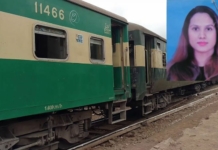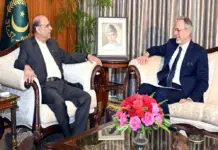Bhatti Gate in the densely populated Walled City of Lahore is not only rich in Mughal era architecture, but is also a reflection of the brotherly relations between Pakistan and Afghanistan.
At the time of the partition of the subcontinent in 1947, many Afghan families moved from Afghanistan to Pakistan, embracing the newly born country as their new home. In the neighbourhood that they settled in, Afghan women live in a way that reflects an independence not generally seen among women in Pakistani or Afghan society.
Ishrat Bibi*, who is fluent in Urdu, Punjabi and Pashto, talked to Minute Mirror exclusively about the Afghan settlements in Lahore and how they had survived in the country.
While holding her fifth generation in her arms, she said, “My great grandfather came to Pakistan from Afghanistan in 1946. Now, I am living here with my fifth generation. We all have our National Identity Cards and other paperwork [necessary for legalization].”
Ishrat also spoke of the difficulties of starting in a new place. “When we moved here, we didn’t have many resources, but with the passage of time we were able to earn good money,” said Ishrat.
The Afghan women can be recognized through their colourful frocks which they still wear over their regular shalwar Kameez. The majority of women work as house help in their surrounding areas and also peel dry fruits such as almonds and pine nuts to earn their bread and butter.
“My father had set up a small factory where we used to make soap holders in these narrow streets. But after his death, we could not keep it functional. Women at home peel the dry fruits that come from Afghanistan. It is a very good business. Many women here have their proper set-up where they buy and sell waste paper,” Ishrat said.
Where women work at home to support their families, men of the house also participate in helping them.
“I have two sons who work as labourers in factories. We are making sure that the next generation completes their education so they can have better opportunities in the future,” Ishrat said with a smile on her face.
Another woman who has worked as a house help said, “We tried to go for respectable work opportunities. Afghan women understand empowerment better than anyone else. We have earned throughout our lives and we feel proud when we help our brothers and sisters coming here for work opportunities.”
Sharbat Gull*, a 29-year-old, while sharing her experience said, “My family has been living here for ages. At one point, my mother told me that she wanted me to marry my cousin in Kabul, but I refused. This is my country, my city, my neighbourhood – all of the people know us and we know everyone here. I didn’t go. I completed my education and all of my cousins are also completing their degrees.”
Afghan refugees in Pakistan
According to the United Nations High Commissioner for Refugees (UNHCR), Pakistan is hosting more than 1.4 million registered Afghans at the moment.
Qaiser Khan Afridi, the spokesperson for UNHCR in Pakistan, told Minute Mirror that some 105,000 asylum seekers have arrived in Pakistan since January 2021, while the majority came after August 15. Out of the arrivals following the takeover of Kabul in August, 22 percent are residing in Punjab.
“Some 830,000 live in Khyber Pakhtunkhwa, over 325,000 in Balochistan, 168,000 in Punjab, and over 65,000 in Sindh province,” he stated while sharing the latest data.
In 2017, he added, the government had registered some 880,000 Afghans who were issued with Afghan Citizen Cards.
Haji Muhammad Khan, vice president of the Afghan Refugee Committee, while talking to Minute Mirror said, “Forty-five more families have come to Pakistan last month and the majority of them have come to Lahore to their relatives to earn money.”
He added, “This is so as in the winter season, there are fewer opportunities to work in Afghanistan as labour. People who are coming to live with their relatives are different than the refugees living in the camps in different areas of Punjab. I make sure that they come through proper paperwork, and I keep myself available for the authorities if they need any legal help with the Afghans.”
Twenty-three million Afghans face acute hunger, nine million a step away from famine: WFP
According to the World Food Programme (WFP), at least 37.7 million of its population of 40 million people – 93 percent – do not have enough food and are currently in a dire need of support from all over the world.
In January, the United Nations asked donors for $4.4bn in humanitarian aid for 2022, the largest appeal ever sought for a single country. They also warned that 97 percent of the population could fall below the poverty line by mid-2022.
Haji Muhammad Khan spoke with admiration of the support that they had received from Afghanistan. He said, “Pakistan is our brotherly nation. People have supported us for more than fifty years. Afghans are coming here as there are no options to earn in Afghanistan. As soon as the situation will get better, they will be going back to their homes. But, they will never forget the hospitality, support and love of Pakistanis.”
Moreover, the already settled families in the walled city and in the suburbs of Lahore have created a well-organized structure to help their Afghan brothers who are coming to Pakistan, specifically in Punjab.
Khan said that every person is connected to him, and if they earn 100 rupees, they donate 50 rupees to help the new arrivals.
“We are not that established. Most of the people work as labourers in factories or in the construction sector. But whatever they earn, they feel it has a share for their brothers who are struggling as new arrivals here. And people from Pakistan also help us a lot,” Khan said.
Problems faced by new arrivals in Pakistan
Juma Khan*, who crossed the border via Torkham in early January, spoke to Minute Mirror about the problems he was facing while living in Lahore.
“I came here for just a couple of months as the weather in Afghanistan was really bad. There is snow everywhere. When I crossed Torkham, I got the COVID vaccine. However, I do not have any proof of vaccination, due to which we are facing trouble while using public facilities like hospitals and transport,” said Juma Khan.
Raja Basharat, provincial minister of Punjab for Law and Parliamentary Affairs, while talking to Minute Mirror said, “Policies about Afghan refugees and people coming in the country for settlement are dealt by the federal government.”
He added, “Our priority is to send them back to their homes if the situation gets better there. We have made sure that all of the people living in the province will get the COVID vaccine. However, the paperwork about the people coming from Afghanistan has to be done by the federal government.”
Regarding the problems faced by the new arrivals, Qaiser Khan Afridi stated that the UNHCR was engaged in discussion with the government to come up with a way forward on the overall response and support for those who required protection and help.
*Names have been changed on requests for anonymity







